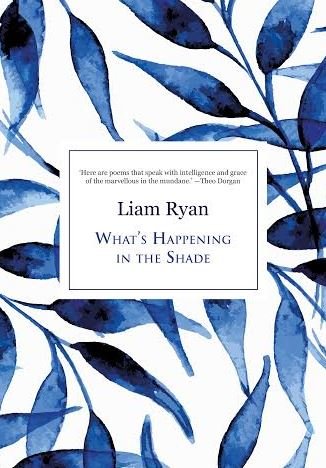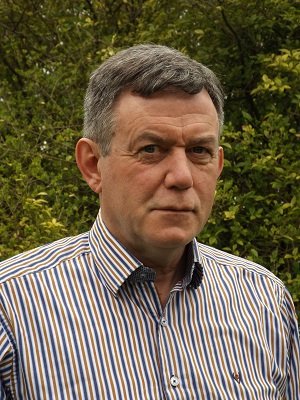Liam Ryan Speaks About What’s Happening in the Shade
Liam Ryan is an architect, a thing which is clear from the beautiful structure and attention to detail in his collection. A Tipperary man, he now resides in Laois with his family. His first collection Touching Stones was published with Doghouse Books in May 2009. His poems and reviews have been published in publications such as The Irish Times, Poetry Ireland and The SHOp Poetry Magazine. What’s Happening in the Shade is his second collection of poems
I am obsessed with the titles of books, What’s Happening in the Shade seems to really reflect the dark undercurrent that moves through your book, is this intentional?
What’s Happening in the Shade is a very intentional title in that I believe that poetry should see/report/present the life happening away from the limelight. The title has a double edge of being a somewhat obscured homage to Philip Larkin’s Whitsun Weddings’ which is one of my favourite poems.
 As a poet you seem to be preoccupied with death or a fear of death or the inevitability of it?
As a poet you seem to be preoccupied with death or a fear of death or the inevitability of it?
I don’t at all think that death is overly featured in my poetry. But there is an acute aware of the utter fragility of human life coursing through the book. This fragility is usually emphasised by death. And there is the question of how can one more fully appreciate life other than with an awareness of it finite supply of days. If the average aged person dies at 70 years; that is 25,550 days. Not really that many!
I think at times you paint an uncomfortable image of Ireland – especially with the poems that touch on emigration or the work force? Do you think it’s the poet’s job to reflect the truth of their time? Or is this something you accidentally do?
My poetry has to I believe reflect the world I live in every day. And that includes interacting with Banks and other such institutions of the real world. And of course I am aware that the Banks in Ireland went broke to the tune of 64 billion; I am aware of the son and daughters, nieces and nephews who have had to emigrate to find work whilst we have a massive homeless problem. The poet is sensitive to his surroundings and the poetry should somehow reflect/interpret/present/highlight and acknowledge the reality of a life lived in the Ireland of today.
What I find most striking about your poems is their honesty, do you struggle with this or is the truth something that comes naturally to you?
Of course I struggle with honesty! Why is honesty so difficult but I work on it; to an extent! In that regard I have been reading a biography of the American poet James Merrill who had a lifelong battle with being honest with himself and his mother. But then that was a another story.
I think one of my favourite poems in the collection is French Kissing, that beautiful blend of humour, insight and truth. I think it speaks volumes for the rest of the collection too, especially in the line “I’ve no idea what she was saying”. Do you see poetry as a way of exploring questions or answers? Or something in-between?
Poetry is a method of discovery; of accidental collisions fusing and procreating. It’s letting the wonders of words work miracles and twinkle; like the light seen through the dewdrop seems so amazing. A process of refraction and clarity; the rainbow effect.

Can you talk a bit about the person behind the poetry? Who are you? Why do you write?
Why do I write? Sometimes it’s the sheer pleasure of relishing, realising a talent; enjoying a gift even if reluctantly. It can be hard work at times from the inception of the idea and polishing it down to the complete poem. Not all poems are born fully formed!
The themes you explore seem to occasionally dip into the past, but have a lot to do with the present? Are you more interested in moving backwards or forwards or simply reflecting what you see?
To me poetry is prose with a lift off; a poem can career down a runway and unless it can generate a charge or speed it cannot achieve lift off into a different plane; the plane of all possibility. The poet then is the pilot and must be able to not only steer but maintain the fuselage of his concept with the firepower of feeling through to a successful landing. And to me poems must have a landing. It is challenging to find a poem, abandoned nowhere with the tailgate left open.
Poems are written to an urge, to a command. Part of the command is the obeying of Kavanagh’s dictum ‘to snatch out of time the passionate transitory’; the command to preserve, to store; the hard won match.
I love the poems about working, there’s a real elemental feel to them? I am assuming you’ve worked in a number of industries from the span of labour covered in the collection? Why is it that this pokes its head into your poetry?
The world of work not only pokes its dirty head into poetry; it is there as the reinforcing steel in the concrete build; obviously work is time and life consuming but on the other hand work is interacting with a whole variety of people; in work a lot of life happens and this I think is where poetry must live too. Read Philip Levine writing about work in Detroit!
I noticed that a lot of the work has small dedications after them? This always fascinates me? What is it you feel about these poems that speaks to those people? Are you hoping to follow in their footsteps or merely pay tribute?
Some might think I am being pretentious by the various references to other poets in some of my shorter poems but as some of my poems are inspired by reading other poets then I think it would be churlish not to acknowledge the impetus. [pullquote] Poetry must be of the heart. The world does not need another smart ass creation. [/pullquote]
Who would you mark as your influences and what would you bring from your reading of them into your work?
I love language and the playful possibilities. Influences are varied and at different times by different poets. John Montague, Dennis O’Driscoll, Patrick Kavanagh and Seamus Heaney would be the Irish poets I have liked a lot. Nowadays I tend to read more American poetry; I love the long lines of CK Williams and Donald Platt; the precision of Elizabeth Bishop; the muscular language of Lowell. But the English duo of Larkin and Hughes has been a foundation too.
How important do you think it is for the poet to read other’s work and be active in the poetry community?
Poetry is a craft; there is no way one can learn and continue in this craft with assiduous reading. And also to be informed. If I am writing a poem on a ‘Selfie’ then should I not know Frieda Hughes has a poem on this subject in recent issue of New Yorker?
What advice would you give poets starting out?
The only advice is to read, read closely and practice. And do it daily. Sarah Howe has the suggestion of taking a few great poems and read them though really really closely; write them out; pin them on the wall of your room; live in them; the turns, the sounds; read them aloud; hear the words; the rhymes; the half-rhymes; the phrasing, the breathing; the intended pausings.
What would you say is the purpose of your poems?
But essentially to me poetry must be of the heart. The world does not need another smart ass creation but a heartfelt charge well-crafted is a welcomed addition to the world today.
You can read more of what Liam has to say here, or buy his book here.

